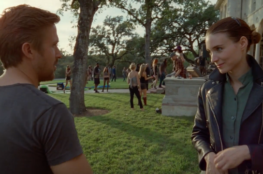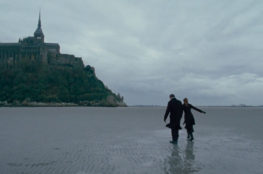Friends, acquaintances, and movie critics told me I needed to see Richard Linklater’s ambitious film Boyhood. Shot over a 12-year period, Boyhood attempts to show the physical, mental, and emotional development of a six-year-old boy named Mason in an unprecedentedly realistic manner while chronicling the ups-and-downs of his (divorced) parents’ lives. The mother, played by Patricia Arquette, has a rough go of it as a single mother who enters into two disastrous relationships with alcoholics before pulling herself out of dependency with a college education. The father, portrayed by the often insufferable Ethan Hawke, is the quintessential deadbeat dad: obsessively cool, self-justifying, and locked in adolescence for 80% of the film, he manages to finally “figure it all out” with his second stab at marriage and children. No negative consequences flow from his actions (or, rather, inaction and inattentiveness). Not even Mason appears noticeably harmed by his father’s absence; he even remains immune from harm by the aforementioned alcoholics, which is distressingly convenient. What would the audience think about Mason’s actual father had his son took a beating or suffered emotional harm at the hands of other men? But then that might raise more troubling questions about the social acceptability of absconding fathers.
As for Mason’s development, the fix is in pretty early. All the stages on life’s way revolve around sex, alcohol, and eventually drugs. Though furnished with two “love interests” near the end of the movie, no roots are grown—which is why it’s impossible to care when Mason is eventually dumped by one of them. His “heartbreak” comes across as petty grumbling and the “life advice” dispensed by dear old dad, with references to feminine fickleness and the romanticism of loss, is cringe-worthily banal. Mason eventually becomes interested in “artsy things” like photography and even learns to read Kurt Vonnegut; and that’s really the whole of his “maturation” process.
So who is the mature Mason? He’s a stubble-faced hipster who like, umm, see has, uh, thoughts and, umm, stuff. Heaven forbid he become a socially awkward math-and-science geek, an overweight Star Trek convention junkie, or a cruel and unlikable jock. The hipster is better geared toward Linklater’s intended audience, philistine artsy types with underdeveloped imaginations and an unsophisticated sense of what it is to be a three-dimensional human being. Life is interesting to the extent that it is entertainment; as such, ironic detachment is the surest way to steer clear of seriousness and truth.
If the film’s scripting were as tight as Mason’s jeans, maybe he’d show signs of wear and tear from years of enduring an unstable home life and lacking anything resembling a responsible male role model. Perhaps his mother, the only remotely sympathetic character in the whole movie, would have been shown trying, unsuccessfully, to fill that void in Mason’s life rather than pursuing her career while a pair of losers set bad—though ultimately inconsequential—examples for her son. No, instead we are left by film’s end with a fairly vacuous young man, high on drugs, looking out at the hills before delivering one of the worst faux profound thoughts in movie history: “You know how everyone’s always saying seize the moment? I don’t know, I’m kind of thinking it’s the other way around, you know, like the moment seizes us.”
Depressingly, the only thing Boyhood seized was 160 minutes of my precious time.


